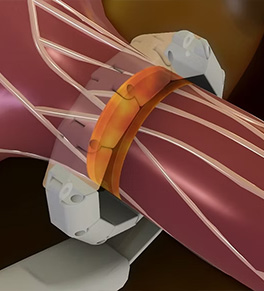First U.S. test of nerve-blocking device for resistant hypertension

UCI Health urologist Dr. Pengbo Jiang recently performed the first U.S. procedure using radiofrequency electrodes to block nerves surrounding the renal arteries without damaging the blood vessel’s integrity.
Jiang performed the minimally invasive, robot-assisted procedure in the first U.S. clinical trial to study the effectiveness of the HyperQure™ extravascular renal denervation system.
It is designed to treat uncontrolled hypertension, a serious health threat affecting millions of U.S. adults. Increased activity of the renal nerves can contribute to resistant hypertension.
The system, developed by the South Korean medical device company DeepQure, was given an investigational device exemption by the FDA in June 2024, paving the way for the UCI Health feasibility study, which is expected to open at a handful of additional U.S. centers later this year.
More than 10 million Americans have high blood pressure that cannot be controlled despite taking three or more medications.
Such patients are at risk of developing diabetes, heart and kidney disease. Studies also show they have a 47% greater risk of death from cardiovascular disease.
Blood pressure reductions seen
In an ongoing HyperQure trial in South Korea, patients have experienced as much as a 30-40 mmHg drop in systolic blood pressure at six months, which exceeds that of intravascular denervation options, Jiang said.
“If this treatment can reduce hypertension over the long term, the potential benefits could be massive,” said Jiang, an assistant professor of urology at the UC Irvine School of Medicine. “It would give patients the opportunity to decrease or stop taking blood pressure medications, which can have side effects.”
The three-year study is open to patients diagnosed with resistant hypertension who are between the ages of 22 and 80. Jiang and co-investigator Dr. Ekamol Tantisattamo, a nephrologist who oversees the UCI health hypertension program, are focused primarily on enlisting participants at high risk of developing cardiovascular and kidney diseases.
Jiang performed the first procedure with Dr. Jaime Landman, chair of the Department of Urology at the UC Irvine School of Medicine.
Novel extravascular approach
Renal denervation has typically been a minimally invasive intravascular procedure performed by interventional cardiologists using a catheter to deliver radiofrequency or ultrasound waves within the renal arteries.
The HyperQure system encircles the vessel’s outer wall, enabling more complete denervation with greater precision and consistency, while also avoiding the potential for heat damage to tissues inside the blood vessel.
The laparoscopic procedure is performed via small incisions on either side of the back. This HyperQure device is looped around one renal artery in two spots, where heat is applied for about one minute each to destroy nerves that contribute to hypertension.
The process is repeated on the second renal artery. The device is removed through the small incision; nothing is left permanently behind inside the patient.
After the surgery, which takes one to two hour, the patient is hospitalized for a few days to check their response to the treatment. Participants will continue to have their blood pressure monitored throughout the study.
“We don’t know how long the effects last, but we will be watching participants closely for signs of nerve regrowth,” Jiang said.
Learn more about the HyperQure renal denervation clinical trial ›
Jiang see patients at the UCI Health Center for Urological Care.
Interested in other clinical trials? Visit our Center for Clinical Research ›
Explore further
Browse more blog posts by topic.




